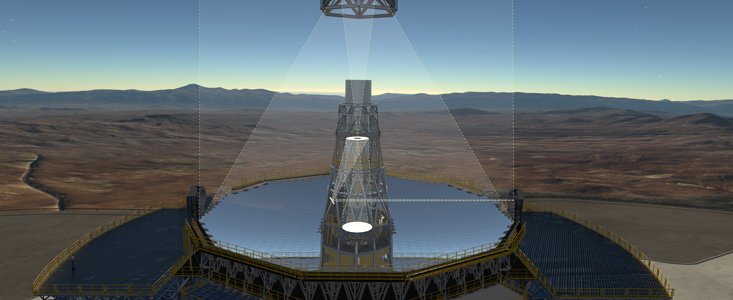Mitteilung
ESO erteilt Teledyne e2v Auftrag für ELT-Sensoren
22. Mai 2017
Die ESO hat der international agierenden Gesellschaft Teledyne e2v einen Auftrag über mehrere Millionen Euro erteilt, bei dem es um den Entwurf und die Herstellung eines Sets sogenannter Large Visible Sensor-Modulen für den Einsatz im Extremely Large Telescope (ELT) geht. Das ELT soll planmäßig 2024 erstes Licht sehen und steht an der Spitze der Teleskop-Technologie. Damit das Teleskop das Universum in feinsten Details erfassen kann, wird das ELT hochkomplexe Systeme Adaptiver Optik verwenden, die es ihm ermöglichen, sich Atmosphärenveränderungen anzupassen. Diese Systeme erfordern Sensoren der höchsten Qualität.
Jeder Sensor mit einer Größe von 800x800 Pixeln wird die renommierte CMOS-Technologie von Teledyne e2v verwenden. Ihre extreme Empfindlichkeit und schnelle Reaktion wird es den adaptiven optischen Systemen des ELT erlauben, rund 700 Mal in der Sekunde winzige Anpassungen vorzunehmen, um die Veränderungen in der Erdatmosphäre zu kompensieren. So ist sichergestellt, dass die entstehenden astronomischen Bilder – von Exoplaneten, fernen Galaxien und allem dazwischen – von der höchstmöglichen Auflösung profitieren.
Der Vertrag ist für vier Jahre abgeschlossen und besteht aus zwei Stufen. In der Anfangsphase werden Muster-Sensoren entworfen und hergestellt, um damit die Machbarkeit des Konzeptes zu bestätigen. Dann werden insgesamt 28 Sensoren am Standort von Teledyne e2v in Chelmsford in Großbritannien gefertigt. Die meisten von ihnen werden in bereits geplante ELT-Instrumente eingebaut, die anderen finden bei Bedarf Verwendung.
Teledyne e2v, weltweiter Marktführer auf diesem Gebiet, hat die ESO bereits mit hochempfindlichen CCD Bild-Sensoren für den Multi-Unit Spectroscopic Explorer (MUSE) am Very Large Telescope (VLT) versorgt, die Sensoren des Unternehmens werden auch im kommenden Echelle SPectrograph for Rocky Exoplanet and Stable Spectroscopic Observations (ESPRESSO) eingesetzt werden.
Links
Kontaktinformationen
Enrico Marchetti
ESO
Garching bei München
Tel: +49 89 3200 6458
E-Mail: emarchet@eso.org
Peter Grimley
ESO Assistant Public Information Officer
Garching bei München
Tel: +49 89 3200 6383
E-Mail: pgrimley@partner.eso.org
Über die Mitteilung
| ID: | ann17027 |

